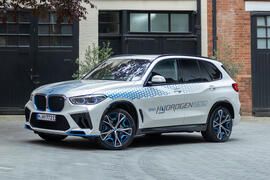
BMW uses Toyota fuel cells in its fleet of hydrogen iX5 demonstratorsRough start to the year has brought filling station closures and collapse of commercial vehicle businesses
This year has started very badly for the prospects of hydrogen as a potential future fuel for cars.
In Germany, hydrogen company H2 Mobility announced at the start of March that it was shutting 22 fuel stations focusing mainly on cars, citing a strategic shift towards goods vehicles.
In California, meanwhile, Shell is reportedly set to shut 10 of its 11 hydrogen fuel stations, after initially announcing it would open 48.
The move will compound the woes of US Toyota Mirai owners, who have seen filling stations close across the country and hefy prices for the fuel at those that remain open.
Such were the issues that California-based owners last year sued Toyota because of the difficulty in getting hold of the hydrogen needed to run their fuel cell cars.
Elsewhere, in February, Renault's and Plug Power’s hydrogen van joint venture, Hyvia, when into liquidation, citing the “too-slow evolution of hydrogen mobility ecosystems in Europe and the very significant development costs required for H2 innovation”.
Also exiting the stage in February was controversial hydrogen lorry developer Nikola, which filed for bankruptcy in the US after running out of cash.
In China, sales of hydrogen fuel cell cars cratered. Advocates of the technology as an alternative to battery-powered cars have long pinned hopes on Chinese development but last year just 25 fuel cell cars were sold in the country, down from 469 the year before, according to data from Jato Dynamics.
In Europe last year, sales of the €73,000 Toyota Mirai – the only viable fuel cell car from a mainstream maker available to buy - seemed to have held up, at 717. But closer inspection showed that of that total, 528 were sold in France, which almost directly correlates to the 500 that Toyota said it would make available as shuttles for the Paris Olympics. Zero were sold in the UK.
Those scanning the horizon ahead can’t find much use for hydrogen. Even the promise of HGVs is looking iffy, according to government climate advisers the Climate Change Committee. “We see no role for hydrogen in heating buildings and only a very niche, if any, role in surface transport,” it said in its long-term-vision Seventh Carbon Budget.
The case for investment among automotive suppliers, who right now are focused on cost-cutting across board, is looking very poor indeed. “We see a significant slowdown in terms of investing in hydrogen technology,” Liam Butterworth, CEO of GKN Automotive owner Dowlais, told Autocar. “The industry has moved towards battery-electric vehicles and hydrogen will be unlikely.”
Dowlais last year sold off its hydrogen storage business, GKN Hydrogen, for a “nominal consideration” after losing too much money, company filings show.
Many have held out hope that hydrogen fuel cell vehicles would solve the need to cut emissions while retaining the driving range and refill speed of petrol and diesel cars.
But the high cost, low power outputs and a refuelling infrastructure that’s been patchy at best have given battery-electric vehicles an almost unassailable lead. “Hydrogen simply does not offer sufficient improvements over batteries, which have far higher power density and capacity,” Bill Russo, CEO of consultant Automobility, wrote in a paper for electric motor specialist Monumo.
Russo cited “the significant levels of investment” that have already gone into battery technology as well as the advantages of having a distributed network of EVs to feed back into the grid.
The potential of hydrogen as an EV alternative still motivates some OEMs, especially in the Far East, with Hyundai, Honda and Toyota promising to continue to work on extending the usability of fuel cell technology.
Toyota also has a partnership with BMW, which has said it will launch its first hydrogen-powered fuel cell vehicle in 2028. BMW CEO Oliver Zipse said in October that hydrogen “will play an increasingly important role in decarbonisation”.
Toyota continues to experiment with hydrogen for motorsport, while Extreme E spin-off Extreme H is persisting with its dedicated hydrogen-powered off-road race series, which is due to start this year.
Stellantis, meanwhile, has said it will continue to offer hydrogen vans for sale, including the Vauxhall Movano Hydrogen in the UK, despite the exit of rival Renault’s H2 van venture.
However, the mainstream prognosis is not good. Unlike battery power, hydrogen vehicles are utterly reliant on a dedicated network of refuelling stations that owners need to be convinced will stay open. But without a pipeline of cars or light vans coming onto the market, investors are unwilling to risk their money on a long-shot bet. Currently, there are just four hydrogen fuelling stations for light vehicles in the UK, according to UK H2 Mobility.
Development of hydrogen planes has also stalled, with Airbus now pushing back the expected viability date for fuel cell aircraft to “later than 2035”, CEO Guillaume Faury said on the company’s 2024 earnings call. “Scaling up the hydrogen ecosystem is challenging and is unfortunately progressing at a slower pace than we had previously anticipated,” he said. Brazil’s Embraer gave a similar timeline.
Hydrogen has had at least as long a development run-up as electric, but the difficulties have proven too tough to overcome. As a fuel for future mass-market cars, hydrogen feels as if it is as good as dead.